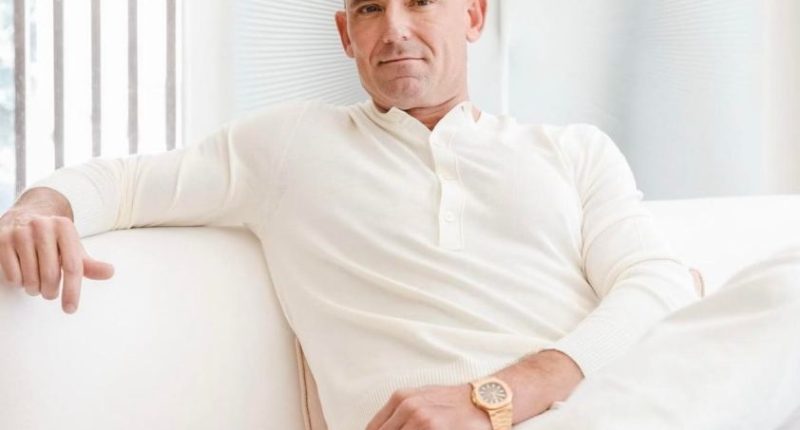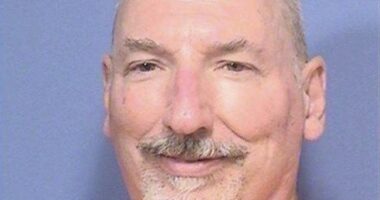Share this @internewscast.com
A PROPERTY tycoon has discussed his bipolar disorder following an incident where he engaged in a high-speed chase resembling the “OJ Simpson-style” pursuit and faced arrest for firing guns from his boat.
Patrick Carroll, having successfully completed treatment and now being “back on top,” shared with The U.S. Sun his limited recollection of his “out-of-control” actions during those months.
Instead Carroll has had to piece together the tumultuous few months from his Instagram posts and from speaking to those close to him.
He has courageously chosen to reveal his experience post mental health awareness month to emphasize the severe consequences of untreated bipolar disorder and to help dismantle some of the stigma associated with mental health conditions.
Carroll said his behavior first started to become more volatile after he sold his management business of over 20 years at the end of 2023.
“I sold my business and it was such a life change, I think not having a lot to do, plus custody issues with my kids, it just hit me,” he exclusively told The U.S. Sun.
“My behavior started becoming erratic. I didn’t know it at the time, but definitely looking back I can see it now.
“That behavior really escalated in March and in April of 2024. I was placed on a 72-hour hold in a psychiatric hospital for shooting off shotguns from my boat in Miami. Obviously that’s not something I would typically do.
“I was diagnosed at that time as being bipolar with psychosis, but I didn’t pay much attention to it, so I didn’t carry on with medication or treatment, I just continued to spiral out of control.
“In May, I had all contact and visitation with my children revoked and that was another stressor which pushed me into full blown mania.
“I continued with my erratic behavior through May and then went to California and was just acting completely crazy. I was going around wearing a bulletproof vest, I had 24/7 armed guards because I thought I was an assassination target, I was getting kicked out of hotels. I was just acting completely out of character.
“I was spending hundreds of thousands of dollars a day. I bought two Rolls Royces in one day.
“The culmination of all that was July 1 [2024] when I went on a high-speed chase with police.
“I was driving with my hazards on and my bullet proof vest on, I thought I was a diplomat with a motorcade. It was a bizarre time.
“I got pulled over, the police got out of their car to talk to me, then I took off and they got back in the car and chased me.
“Then I pulled over at an intersection, got out of the car and was acting very erratically and bizarre to say the least. They approached me with guns drawn, but I got back in the car and took off again.
“Looking back at it now, it’s scary to lose control and do all the things I did. I’m very lucky that I got through it alive.
Patrick Carroll
“All as I remember is this extreme, irrational paranoia, thinking that people were out to get me and how I’ve got to get away,” Carroll explained.
“It was just an overwhelming worry and I must have thought the police were trying to kill me.
“At that point the news helicopter was filming the whole thing overhead from the sky. I got on the interstate and it was like an OJ Simpson-style car chase with multiple police vehicles chasing me. I don’t know what I was thinking.
“I eventually stopped the car, got out and started running on foot. And to be honest, I’m just so lucky and thankful that the police didn’t shoot me because afterwards it turned out I had a gun on me.
“Fortunately these police officers were intelligent, recognised I was having mental health issues, and showed an awful lot of restraint. I even thanked them at the court hearing for showing such restraint.
“None of this behavior was anything to do with drugs or alcohol it was literally this manic phase where I was completely blacked out.
“It was a crazy period to say the least.”
After the car chase, Patrick checked himself into McLean Hospital, a psychiatric facility in Massachusetts, where he was diagnosed with bipolar disorder and began a treatment program.
He’s spent the following months taking medication to stabilize his mood and undergoing in depth counselling and therapy.
‘SAVED MY LIFE’
“It’s taken almost a year to piece together what happened, by looking at my erratic Instagram posts to people telling me stories, and really going back and reliving it, which has been extremely tough,” he said.
“At the time I didn’t know what I was doing. Until I had treatment in August I didn’t remember any of it.
“Checking into McLean really saved my life. I got diagnosed with bipolar disorder and they told me I was manic and I had likely been manic for several months.
“They got me medicated, stabilized and a year later I’m still talking to the doctors up there at least once a week, I take medication.”
Patrick said it was a huge blow to receive the diagnosis but once he started researching the condition he realised it was likely something he had been unknowingly dealing with throughout his life.
All as I remember is this extreme, irrational paranoia, thinking that people were out to get me and how I’ve got to get away.
Patrick Carroll
“Getting a diagnosis for something incurable and that you have to live with for the rest of your life is shocking,” he said.
“I was also concerned about the stigma. I’ve worked with institutional investors for 20 years and I was worried about what kind of stigma my diagnosis would carry, what else it would affect in terms of my business interests.
“But there was also a relief, which came from knowing why I’d been feeling certain ways all my life.
“Looking back at it now, it’s scary to lose control and do all the things I did. I’m very lucky that I got through it alive.
“Also although there’s no cure for it, it can be dealt with through medication.”
Patrick admits his own attitudes towards mental illness have completely changed after living through it himself.
And he realises that there are positives to his condition which have likely contributed to his success as an entrepreneur.
TABOO TOPIC
He even drew parallels between himself and controversial Kanye West, who has previously revealed he has been diagnosed with bipolar disorder.
“Funnily enough I always thought mental health was for soft-type people to talk about, it was taboo in my opinion,” Carroll said.
“I thought taking medication was weak. I thought ‘Just get over it.’
“When I look back to my 30s now, I was hypomanic for a lot of that time, which is where you’re not in full-blown mania but you are operating at a level most people can’t.
“You are highly-energised, strategic, creative. I think a lot of entrepreneurs deal with it – it’s been speculated Steve Jobs had it and Elon Musk has spoken about how he thinks he is bipolar.
“I think early on in my career it definitely helped me do things that I probably wouldn’t have been able to do without it, for example I would work around the clock.
“I had non-stop energy, I could connect dots. I feel like I could see around corners and predict things three to five years out in a way a lot of people didn’t, and all of those things helped me build my business.
My doctor said my brain is like a Ferrari, like a high performance car, but you can’t run it full throttle all the time.
Patrick Carroll
“I think there are positives with it but left untreated it can blow up your entire life. It can be a blessing and a curse but unmedicated it can get out of control very quickly.
“I reached out to a lot of business colleagues when I got my formal diagnosis to let them know I had bipolar, and lots of them said ‘We could have told you that.’
“People see things like mood swings, and think he’s moody, he’s a hothead. But it’s really a lot different when you have a full blown manic attack.
“I don’t like to compare myself to him, but clearly Kanye West has experienced a number of public manic attacks, which have frankly blown his career up with the comments about Jewish people then his latest rant about his cousin.
“However I feel that people associate bipolar with Kanye and people being out of control, you don’t really see the people who are receiving treatment and who are living successful lives with bipolar.
“I’m on mood stabilisers that keep me from going on overdrive. My doctor said my brain is like a Ferrari, it’s like a high performance car, but you can’t run it full throttle all the time.”
COURT FIGHTS
Unfortunately Patrick’s manic episode left him dealing with criminal cases, which have all now been dropped, and civil lawsuits, some of which he is still fighting.
Los Angeles prosecutors last month dropped charges of evading police and displaying a firearm after agreeing to take mental health counselling for two years.
He also faced an aggravated stalking charge against his ex-wife, which was dropped in November.
In January, two of his former private security guards sued him in Los Angeles County Superior Court and he also faced a lawsuit from a Miami restaurant manager he allegedly spat on – and was banned from several eateries in the area during the period of his manic episode.
Both cases were settled out of court.
Patrick said he was “disappointed” that people were trying to make money from his mental illness.
‘BITTER PILL TO SWALLOW’
“Unfortunately this has caused me a lot of litigation over things I have none or very little memory of,” Patrick said.
“So it’s a bitter pill to swallow that people who clearly knew I was having a mental health issues are trying to monetise it.
“I think when I first started talking about my bipolar, a lot of people thought I was using it as an excuse to cover up my bad behaviour, I was trying to cover up the stupid things I did.
“But this isn’t the same as going out and getting really drunk and doing something stupid. It literally is a disease where something clicks in your brain and you end up making decisions that you’re not cognisant of.”
RAISING AWARENESS
And he says while his business interests were not affected, as he had sold a lot off before the manic attack, he has had to spend some time educating business associates about his condition and how is it now managed and under control.
Patrick says he realises he is lucky to have the resources to afford excellent treatment and now wants to use his platform to raise awareness of bipolar.
Already a philanthropist who has donated millions of dollars to charities and over $1 million worth of sneakers to underprivileged kids, Patrick now wants to extend his charity work to mental health.
“I think growing up and even a few years ago, I considered myself a macho, man’s man and when I heard people’s mental health stories, I’d think to myself come on suck it up,” he said.
“So I like the idea of coming out and talking about it, because it is not just something you can shake off.
“The manic attack that I went through was very public and very scary but even now I deal with depression issues where I just cannot even get out of bed.
“And if you take a step back and look at my life, most people would say he’s a wealthy guy with a great life, look at his house, what has he got to be depressed about.
“But it’s not about an event or an incident or I’m sad about something, it’s literally a chemical imbalance.
“And I think a lot of people with mental health issues don’t really understand it, are embarrassed to talk about it or maybe don’t have the resources to have the type of treatment I did.
“I’m blessed that I was able to go to the best hospital in the country for mental health and bipolar, but it wasn’t cheap so not everyone can do that.
“So I want to use my platform to be able to talk about my treatment, to educate people and also look into philanthropic work I can do around it.
“Bipolar is something that only affects 1 percent of the population but when you look at the population of the United States that’s a lot of people.
“Unfortunately, in many people it goes untreated and they can end up in jail, losing their jobs, blowing up their relationships, addiction issues. Lots of people with it try and self medicate.
“You have these really high highs, that frankly feel good. You think you’re the smartest person in the world, you think you’re the best looking people in the world and you want that feeling to continue. But on the flipside of that you have these real depressive episodes.
“The only way to deal with that is through medication, but people might not have the money or desire to do that so they turn to other substances.
“I think hopefully having someone like me talking about it and addressing it as what it is – a disease like any other – may help people.”
























